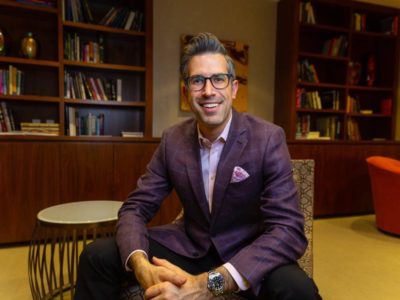Saving money as a college student feels like a myth. You try to cover three meals a day—yes, Ramen counts—and pay your rent, but making ends meet proves challenging. So when your grandma sends along $100 for your birthday, you can’t help but treat yo’ self and hit the mall. Cue the financial advisor.
While splurging on a new pair of headphones may seem like the most appealing option, a financial advisor can point out better spending habits that you’ll appreciate in the long run.
Sounds great! What does a financial advisor actually do though?
Douglas Boneparth, a CERTIFIED FINANCIAL PLANNER™(CFP®), co-author of The Millennial Money Fix and President of Bone Fide Wealth, LLC, a boutique wealth management firm in New York City, helps successful Millennials achieve their #goals.
Boneparth examines cash flow as well as the bigger picture—your career and future aspirations. He wants to know about that MBA program on your radar. Tell him about the CEO position you’ve always imagined. The Miami beach house, the Tesla, the #wanderlust vacations. Dream big. Or dream realistically. Boneparth listens to his clients’ individual goals and creates a financial plan that’s achievable and actionable. Not to mention, a payment plan to tackle a mountain of student debt (more on that later).
Most importantly, Boneparth takes into consideration that careers today look very different than they used to. “Many of us are going to be working longer than our parents or our grandparents, but I think we’re going to be working differently. We might get to do something we like to do or love to do or that has purpose or is flexible,” he said.
In other words, pursue your dreams and save for the future by working with a financial advisor.
1. What’s a day in the life of a financial advisor like?
Financial advisors lead more exciting lives than you may think.
“No two days are ever the same, just as no two clients are ever the same,” said Cindy Axelrod, certified financial planner and head of the financial planning major at Temple University’s Fox School of Business.
Meeting with Clients
Your financial advisor may spend the day on calls or in-person meetings with clients. A large part of the job involves relationship building. The more a financial advisor learns about his or her client’s unique goals and life plans, the more customized the financial model.
Financial Support
Support, support, support. A financial planning meeting involves lots money advice (obviously), especially on how to build your cash flow. A financial advisor can offer guidance on how to consolidate and pay off debt. As for large purchases, like your first home, you can lean on your financial advisor on how best to save and spend.
Developing Financial Plans
Another part of the financial advisor career involves drafting financial plans based on each client’s unique situation. “It’s planning how we can get people to live the best life they can possibly live while using all the assets they’ve earned over time,” said Chris Gibbons, senior financial advisor at Cordasco Financial Network.
Investing & Retirement Accounts
After determining a client’s needs, an advisor executes the necessary work for clients to meet their financial goals, like investing, allocating funds and planning for risk. When it comes to retirement accounts, a financial advisor can help you diversify your portfolio. Get ready to save smart.
Staying Current
If your financial planner is busy reading, it’s most likely on the latest legislative changes that can affect the always-evolving financial planning industry. Your financial advisor will ensure you’re ahead of the game.
2. What can a financial advisor do for me?

A financial advisor is trained to see money differently than you.
“You as an individual are subjective about your money. Financial advisors look at the numbers and listen to what you’re saying, but they see the numbers and they’re pretty black and white as to where your money is going,” Axelrod said.
Do you struggle to keep the dollar bills in your pocket? Or maybe you can’t begin to wrap your mind around how a 401(k) works. Did someone say ROTH IRA? Fortunately for you, financial advisors have your back. #CollegeLife comes with lots of financial firsts including moving out, living solo, earning an adult income and experiencing debt.
Mastering cash flow
According to The Millennial Money Fix, mastering cash flow is key.
“You should be able to quantify your monthly ins and outs, while also keeping the bigger picture in mind,” Boneparth writes.
Can you save $250 a month and stick to that plan? That’s a great start! Financial planners can create a budget for college students and recent grads. Logging your income and how much goes to expenses (and let’s be real, margaritas) makes it easier to visualize your cash flow.
“[Making a budget] is the first thing in your life you’re not getting graded on, but you really need to learn to be honest and realistic on it,” Axelrod said. You want to have money to pay for your debt, rent, Trader Joe’s runs and still have some cash for splurging.
A financial advisor can even save you from making a financial mistake you could regret for years. Ever hear of being house poor? Don’t let that be you.
Paying off debt
Meeting with a financial advisor at a young age helps you develop thrifty habits and avoid getting strapped with unnecessary debt. A financial advisor can have a frank conversation with you about how your student loan debt will impact your life after college.
“Helping [students] understand basic budgeting and how student loan payments fit in with their other expenses is an often-overlooked financial skill,” said Joe Orsolini, a certified financial planner with College Aid Planner, Inc.
Saving for retirement
As for retirement planning, financial planners can walk you through making the most of 401(k) and ROTH IRA accounts. Understand how company matching works. Figure out how much to save each month.
Spending our days on a golf course might not thrill us like it does our grandparents, but retirement will creep up on us. You’ll need your finances in order when the wrinkles appear and the grey hair starts growing.
3. How does saving for retirement actually work?

“If someone starts saving for retirement in their 30s and 40s, the numbers are astounding compared to someone who starts saving for retirement in their 20s. [Especially] when looking at how much you’d have to save in your 30s and your 40s versus someone who started saving in their 20s,” Axelrod said.
Check out how this works in real time:
First, assume an eight percent rate of return. If you start saving for retirement as soon as you hit the bars on your 21 run and save $5,000 every year until you hit 62, over $1,400,000 will proudly sit in your retirement account.
However, if you instead choose to accent your youth with a fancy car, nice house and luxurious vacations you’ll hit some trouble down the line. At 41, you decide you need to start saving if you want to retire at 62. You now have to save $27,800 every year to have the same amount saved at 62. Good luck scraping that out of the couch cushions every month.
If procrastination names your game, imagine starting retirement saving at 51. Now you’ll need to save $84,300 every year to save the same amount by 62. Unless you made it big as the next wolf of Wall Street, that just isn’t realistic.
4. What do I need to know before going to a financial advisor?

Understanding how much money you bring in each month and how much you spend will help your new financial advisor jump right in to sorting out your life. Download free Boneparth’s #FinLit worksheets to make your life easier.
Walk into your first financial advising appointment with concrete goals in mind. Ask yourself:
- How much do you want to save in the next five years?
- Do you want to invest your money or focus on covering your debts?
- What is the best plan for you to pay back your student loans?
- How much would you like to have saved for when you retire?
Jumpstart the process of whipping your bank account into shape.
You should also consider how comfortable you feel investing in unpredictable markets. Knowing your risk tolerance level determines the best way for you to invest.
“[As a young person], you don’t have your spouse, you don’t have the kids, you don’t have the dog, you don’t have the house or second house, you’re not saving for college for your kids. If there’s ever a time you can take on some investment risk, it’s now,” Axelrod said.
Taking on the responsibility to tackle your finances may exhaust your brain. After all, you majored in Romance Languages so you never had to think about numbers. Don’t feel afraid to ask your financial advisor about the basics to saving money. You have the right to understand the whole process— this revolves around your money.
Also come with an idea of what your student debt looks like, even if you must scour your email to remember who you took out your student loans with in the first place.
“If you’re taking out loans, you just enrolled in Student Loans 101. It’s your responsibility to now inform yourself with everything having to do with it,” Boneparth said. Welcome to the real world.
You first have to understand what type of student loan you took out in the first place. Students who demonstrate financial need can take out Direct Subsidized Loans that you don’t have to pay interest on until six months after graduating, while any student can take out a Direct Unsubsidized Loan.
With a Direct Unsubsidized Loan, though, interest starts accruing right away. Grad students of parents of dependent undergrads can take out Direct PLUS Loans, but be careful because there’s no limit on what you can take out. You may also choose a Direct Consolidation Loan that lumps all your federal loans into one.
Once you take out that moolah, you eventually have to pay it back. Fortunately, you can choose from a few repayment options. A standard repayment plan gives you a fixed monthly payment amount for up to 10 years, while a graduated repayment plan starts off with lower monthly payments and gradually increases the monthly amount.
If you have more than $30,000 in debt, you qualify for an extended repayment plan which lets you pay off your loans in up to a 25-year period. If you qualify for an income-driven repayment plan, prepare to even lower monthly payments determined by a percentage of your income (usually 10 to 20 percent).
5. What are the different types of financial advisors?

“A good financial advisor can provide a road map for your entire financial future to increase the likelihood that college students stay out of major financial trouble and are more likely to achieve their goals,” said Matthew S. Eads, chartered financial analyst and portfolio manager at Eads & Heald Wealth Management.
Look for a financial advisor with professional credentials like CERTIFIED FINANCIAL PLANNER™ (CFP®), Chartered Financial Consultant (ChFC), and Chartered Financial Analyst (CFA) to ensure you get the best advice.
Most financial advisors can be categorized as either commission-only, fee-based or fee-only.
- Commission-only financial advisors get paid to sell you products (that you may not need) and typically don’t provide comprehensive advice and planning or long-term planning.
- Fee-based advisors earn their keep by charging a flat or fixed fee based on the total amount of your assets, income or some other criteria for advice and investment services, but can also charge commissions for certain products.
- Fee-only advisors only sell advice and planning services based on a fixed or flat fee and do not receive commissions of any kind.
Seek out an advisor who has experience working with your goals, be it investing or paying off debts.
“If someone is graduating and they have no debt and they want to seek a financial advisor, then the person focusing on debt strategies probably isn’t the right fit for the person opposed to somebody coming out with a lot of debt and not good job prospects,” said Steve Cordasco, founder and CEO of Cordasco Network. Working with an advisor knowledgeable about your financial needs will ultimately help you reach your goals.
Many advisors only accept clients who have a minimum amount of wealth. If you haven’t landed that real adult salary yet, look for a pro bono financial advising event. Many local firms participate in these community seminars and workshops and give free financial advice.
You can also connect with student professional organizations like the American Marketing Association or Financial Planning Association and speakers from the finance industry who come to campus.
“Many advisors will work with college students at greatly reduced rates in order to account for the fact that these students are often living with very little, if any, income,” Eads said.
Some advisors will even delve into the goodness of their hearts and take on younger clients as a passion project. They likely remember what it felt like to sustain life off of care packages and Easy Mac.
6. Why should I consider my financial future BEFORE choosing a college?

Tell me one thing worse than graduating with a degree and realizing you make way less than you hoped for?
Oh wait—how about throwing away tens or hundreds of thousands of dollars on a degree you never felt passionately about in the first place?
This is an all too common story today. In his book The Millennial Money Fix, Boneparth emphasizes the importance of financial research before selecting your college. “It’s hard to get the return on the investment when you’re leveraging yourself to get something that might not get you the return you’re thinking about,” he said.
Thoroughly investigating your prospective college and career path can save you countless bank account notifications warning you your balance has dipped below $25 in years to come. Before committing to a school or major, hop on the Internet to figure out:
- The average salary you’ll make after graduation
- How much you’ll take out in student loans
- The expenses you’ll pay each month like rent and bills
Plug the numbers into Excel to determine if the college experience you want justifies how much you’ll save each month post-graduation. No one can answer that question for you, but this exercise will help you make an informed, rational decision.
Your dream of attending an out-of-state, private school may not be worth the everlasting debt. “Or you could say, ‘Alright, I could do something more affordable, but I really want the networking connections this school is going to bring me and it’s really worth it for the degree,” Boneparth added.
In his book, Boneparth compared the current state of student debt to the housing crisis of 2008. “Both demonstrate how uninformed financial decisions over a long period of time can result into something catastrophic,” he said.
While our parents borrowed money against their homes, millennials borrow against their dreams to educate themselves. It comes down to people not realizing the financial effects of borrowing long term. The housing crisis blew up on our parents’ generation, while too many of our peers already experience the ramifications of the student loan crisis. Think about those dealing with staggeringly-high monthly payments or moving back in with their parents.
Fortunately, some people work every day to help you navigate life’s monetary hurdles: financial advisors.
“It’s very important for everyone to get financial education, whether you get that in college or coming out of college,” said Chris Gibbons, senior financial advisor at Cordasco Financial Network. “[Whether you] get it from [your] parents, financial advisors or the internet, get as much education as you can, live within your means and save a bunch of money. The rest… will take care of itself.”
7. How can I choose the best financial advisor for me?

Feeling comfortable shopping at Forever21 and H&M for years to come qualifies as a major perk of living the young adult life. Similarly, a financial advisor familiar with the unique needs of your age group should top your list of requirements.
“You want someone who is going to look out for your best interest and help you make the best decisions based on your own unique circumstances,” said Christopher Walsh, certified financial planner at Wealth Wise.
Investing might not be your top priority fresh out of college with a starting salary. Look for a fee-only financial planner who won’t push financial products or snap up a chunk of your income. After all, you just spent four years studying in the library to get it.
Above all, find a financial advisor who makes you feel as comfortable as your mom does when you go home to visit over winter break.
“You want to work with someone that looks at your total financial health and picture, not just one aspect of it. …There is nothing more precious or private than your financial standing. [Financial advisors] aren’t there to judge but they will see all your financial data,” Axelrod said.
Your finances rank as one of the most personal subjects you can talk about, so collaborate with someone who truly understands you and your aspirations. Welcome to The Real World—now put your best financial foot forward to save yourself from incapacitating money woes down the road.
Now focus on your budding career. You earned it.
Pro tip: Get smart about your money with The Millennial Money Fix and download Bone Fide Wealth’s free financial worksheets.



















